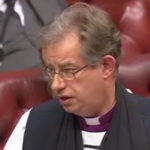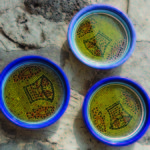A Presidential Address to the Diocesan Synod
“They have treated the wound of my people carelessly” says the prophet Jeremiah of the leaders of his day.
“They have treated the wound of my people carelessly, saying “Peace, peace” where there is no peace” (Jeremiah 8.11).
All those called to leadership in society and the church need to pay careful attention to the wounds of God’s people. God’s people in every part of the world. There are no simple solutions to those ills. There is no remedy in pious slogans. Reality is not changed by soundbites. The answer does indeed lie in peace, shalom, wholeness but words alone are not enough to mend the fractured earth. “They have treated the wounds of my people carelessly.”
The world is facing the worst humanitarian crisis since 1945 according to the United Nations. A terrible famine stretches across Africa from Nigeria to Yemen through Somalia and Sudan. The Disasters Emergency Appeal was launched at midnight on Wednesday. I hope we will respond generously as individuals and churches.
The commentators agree, these catastrophes are the direct result of human conflict: disastrous civil wars and rivalries; corruption and greed. Fragmentation, blindness and complacency in the developed world as well as the developing nations. On Thursday, in the midst of a humanitarian disaster the world’s richest nation cut its aid budget.
“They have treated the wounds of my people carelessly,” says the prophet. Our world is interconnected. We celebrate later this the Fair Trade Foundation’s plans for relaunch I am joining those who are supporting amendments to the Criminal Finance bill to make it more difficult for politicians in every country, including Africa, to launder funds and avoid the taxation which is needed to build local schools and hospitals and nations.
Parliament passed the bill this week to begin the process of leaving the European Union. The British electorate voted a year ago to change our relationship with Europe. There are different and legitimately Christian views on how that relationship is best re-imagined. As that process begins we need to be honest and alive to the dangers of fracture in our wider European relationships and fracture in our own United Kingdom.
There is a pressing need to reach deeper than the careless slogans which shaped the referendum campaigns a year ago. There is a need for a serious reimagining of Britain’s place in the world and our national identity and values. The wounds within our nation are real. The referendum exposed them. The Brexit process must now seek to heal them and to change but also strengthen European integration.
The Churches and the faith communities have a critical role to play in healing divisions and renewing political debate from the profoundly Christian foundation that every man, woman and child is made in the image of God and of inestimable value.
There is inequality and fragmentation within our own communities within this Diocese. According to figures published yesterday, there are now four million children in poverty in the United Kingdom, the highest since the 2008 financial crash. The Diocese is publishing today a powerful new piece of research, For Richer, For Poorer, Poverty and Livelihoods across the Diocese of Oxford.
The report compares statistics from neighbourhoods across the entire Diocese to build a picture of poverty and deprivation Oxfordshire, Berkshire, Bucks and Milton Keynes. The maps show fragmentation: wealth and poverty side by side. Poverty in relatively wealthy communities is often masked and hidden. The report exposes what churches in many of our communities already know: there is a need for foodbanks, for homeless provision, for work with refugees for engagement with children’s centres all across this Diocese.
We need to take great care in our nation and across the world. Inequality is growing. Awareness of inequality is also growing, driven by social media. In those conditions resentment and anger deepen and surface in unexpected ways. “They have treated the wounds of my people carelessly.”
The world changes. Life grows more demanding for many, especially for those in work. I’ve heard much on my deanery visits of the stress created in families and individuals which is caused by the high costs of housing in this region, the need for both partners in a marriage to be working in demanding jobs, the accelerating pace of life and the fragmentation of families and individuals which is the inevitable result.
In this context we need as a Church and as the Church of England in this diocese to take ourselves much more seriously, if I may say so. What we are and what we do in every city, town and village is vital and transformative for individuals and communities. By the grace of God, we are making already an immense difference.
As we gather for worship in Lent, we sometimes use these words:
“We come from scattered lives to meet with God
Let us recognise his presence with us.” (Common Worship, New Patterns for Worship, A Penitential Service, Greeting).
Week by week, those who lead scattered lives in a fragmented world gather. We bring our wounds and the wounds of the world to God’s love and healing and grace. We find again unity and wholeness within our worship and prayer.
We find again the strength and vision we need to be people of influence, disciples and apostles of Christ in our families, in our communities, in our workplaces and in wider society.
This morning in our Synod we will consider together the report Setting God’s People Free on lay leadership and discipleship. Matthew Frost, one of the authors of the report will join us. The report calls for a change of culture in our common life: a shift to find a way to form and equip lay people to follow Jesus confidently in every sphere of life as disciples in our common baptism. There has never been a more important time for the Church to break free of clericalism and affirm the value of both laity and clergy in the mission of God to the world based on our common baptism.
The world and our nation need us to be the best Church we can be in this season and in our time. The wounds of God’s people are so great and so serious.
It is in that context that we need to set the deep questions with which we wrestle and this morning we will also spend some time reflecting on the current debates on human sexuality. Here too the wounds of God’s people are deep and serious. There is need for great care and tenderness in our dealings one with another, for careful listening and discernment. The Archbishops have called in their letter after Synod for a radical new inclusion in the church. I am personally committed to that vision. We will need to explore together in the coming months what that call might mean within this Diocese for lesbian and gay people, those who are bisexual, transgendered and intersex, both within and beyond the church.
“We come from scattered lives to meet with God
Let us recognise his presence with us.”
In the period since this Synod last met, I have visited 15 of our 29 deaneries. Thank you for your welcome and hospitality. Each day has been inspiring in different ways. I’ve come back full of joy and hope and stories to tell.
I’ve been learning much, not least that we are indeed a large and diverse diocese. No two deaneries so far have been the same. We are called to be the Church in so many different places and contexts and ways.
I have been asking two questions as I travel, what kind of Church are we called to be and what are we called to do together as a Diocese. What are our priorities?
I believe we are called to be a more Christ-like Church: the church of the beatitudes. As many of you will know, I’ve been searching for just three words which will capture that ethos for the next part of our life together: to bind the Diocese together in God’s mission and guide us forward.
The three words are settling now. I believe we are called to be and become a contemplative diocese, poor in spirit, rooted in God’s presence, in peace, and wholeness and stillness. We come from scattered lives to meet with God. In a wounded, fractured world it is only a deeply contemplative Church which can bring God’s grace and love to those who need it.
I believe we are called to be and become a compassionate Church: taking seriously the wounds of God’s people.
I believe we are called to be and to become a courageous Church as laity and clergy together: courageous in bringing peace; courageous in seeking justice; courageous in our witness to God’s love in Jesus Christ.
We will be gathering more than a hundred people from the leadership community of the Diocese in May to work on these questions: what kind of church are we called to be and what are we called to do together. Please pray for that gathering. I will report the outcomes back to this Synod in July.
“They have treated the wound of my people carelessly, saying ‘Peace, peace’ where there is no peace.”
We are to be people who take wounds seriously: in the world, in our nation, in our Church, in ourselves.
We are to be a Church of radical inclusion for all, cherishing the gifts of lay and ordained together.
We are to be a Church which is contemplative, compassionate, courageous.
We are to be a Church which takes herself seriously not for our own sake but for the sake of the world.
We come from scattered lives to meet with God
Let us recognise his presence with us.
+Steven Oxford
18 March 2017



